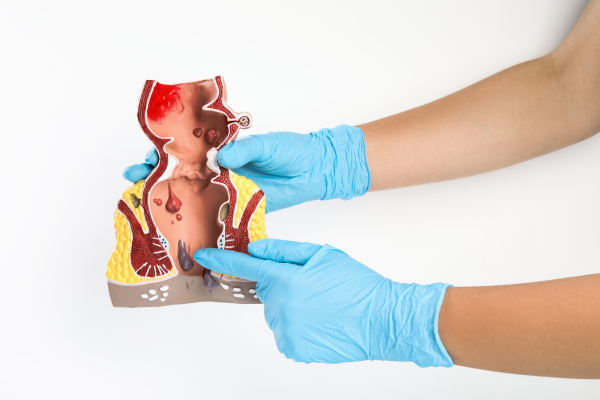𝗣𝗶𝗹𝗲𝘀
Piles is a condition in which the blood vessels around the anus swell and especially while passing stools. They can have a range of sizes and can be internal or external.
Internal Piles- These are inside your stool, you cannot normally see or feel them. They usually don't hurt because there are fewer nerves that sense pain.
External piles- You will find these under the skin around your anus, where there are many pain sensing nerves.

𝗦𝘆𝗺𝗽𝘁𝗼𝗺𝘀 𝗼𝗳 𝗣𝗶𝗹𝗲𝘀
- Lumps around your anus.
- Bright red blood after you poop.
- An itchy anus.
- Slimy mucus in your underwear or toilet paper after wiping your bottom.
- Pain while sitting or at other times.
- Moist bumps that look pinker than the surrounding area.
𝗖𝗮𝘂𝘀𝗲𝘀 𝗼𝗳 𝗣𝗶𝗹𝗲𝘀
- A diet low in fibre.
- Difficulty doing something physically demanding, such as lifting something heavy.
- Pregnancy, when you're growing the uterus presses on your nerves.
- Constipation or excessive straining while passing motions.
- Chronic cough or wheezing.
- Prolonged periods of sitting or standing.
𝗣𝗿𝗲𝘃𝗲𝗻𝘁𝗶𝗼𝗻 𝗼𝗳 𝗣𝗶𝗹𝗲𝘀
- Wipe your bottom with a damp toilet paper.
- Have a warm bath to ease the itching and pain.
- Drink plenty of fluids and eat lots of fibre to keep your poop soft and easy to pass.
- Use an ice pack wrapped in a towel to ease discomfort.
- Keep your bottom clean and dry.
- Exercise regularly to help prevent constipation.
- Avoid alcohol, tea, coffee and cola.
𝗥𝗶𝘀𝗸 𝗙𝗮𝗰𝘁𝗼𝗿𝘀 𝗼𝗳 𝗣𝗶𝗹𝗲𝘀
- Age: older people are more likely to get them because the tissues in the anus grow weaker as you age.
- Genetics: If other family members have haemorrhoids like your parents, you more likely to develop piles.
- Pregnancy: Pregnancy increases your risk in two ways. The weight of the fetus puts extra pressure on your rectum. You are also more prone to constipation.
Too much sitting: A mostly sedentary lifestyle, or a job that requires you to sit for a long period of time, increases your risk. When you don't move around much, blood pools in your anus, putting pressure on the blood vessels.
𝗪𝗵𝗲𝗻 𝘁𝗼 𝘀𝗲𝗲 𝗮 𝗗𝗼𝗰𝘁𝗼𝗿
If you have bleeding, feel a lump in the anus, or have rectal pain, even if you have already been diagnosed with haemorrhoids and your symptoms are not improving with fibre supplements, an increase in water intake, over-the-counter pain relievers or a warm bath then you may indicate it's time to go see a doctor.
𝗪𝗵𝗮𝘁 𝘄𝗲 𝗱𝗼?
𝗢𝗽𝗲𝗻 𝗣𝗶𝗹𝗲𝘀 𝗦𝘂𝗿𝗴𝗲𝗿𝘆:- During open piles surgery, the piles surgeon uses local anesthesia to sedate the area of the anus near the sphincter muscles. The patient will feel less or negligible pain in the anal area. In open piles surgery, the surgeon makes a long incision to perform the surgery.
𝗔𝗱𝘃𝗮𝗻𝗰𝗲𝗱 𝗟𝗮𝘀𝗲𝗿 𝗣𝗶𝗹𝗲𝘀 𝗦𝘂𝗿𝗴𝗲𝗿𝘆:- Laser surgery for piles is painless because there are no cuts and no stitches.
𝗦𝘁𝗮𝗽𝗹𝗲𝗿 𝗣𝗶𝗹𝗲𝘀 𝗦𝘂𝗿𝗴𝗲𝗿𝘆:- Stapled hemorrhoidectomy is a minimally invasive procedure to treat haemorrhoids, especially internal haemorrhoids. The procedure helps to remove excess or prolapsed hemorrhoidal tissue and restore the remaining tissue to its anatomical position.
